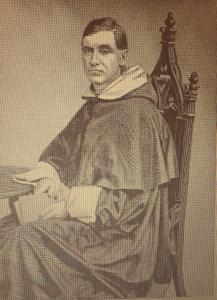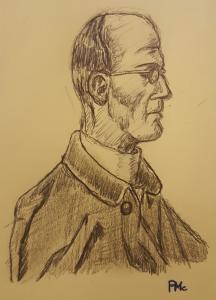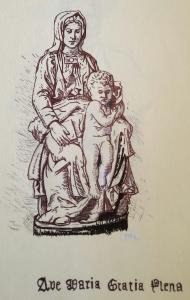 As a human community, we’ve been going through a tough time, to say the least. But as Pope Francis has said in his recent Urbi et Orbi Message, “We are all in the same boat.” And we’ll get through this together.
As a human community, we’ve been going through a tough time, to say the least. But as Pope Francis has said in his recent Urbi et Orbi Message, “We are all in the same boat.” And we’ll get through this together.
As April 2020 begins, it’s worth pointing out that this is National Poetry Month. Poetry can help us get through this journey in a unique way. It can, I believe, provide spiritual consolation and strength at a time when many are feeling sadness, loneliness, desolation, even despair.
Does poetry still matter in the age of the Internet? Yes, it does, according to Dana Gioia, author and Poet Laureate for the State of California. Perhaps more than ever:
People underestimate the power of poetry. I’ve often been told poetry is remote, elitist and unpopular. I’ve never believed this. The poor people who raised me loved poetry. They quoted and recited poems. It was one of life’s pleasures. Poetry’s musicality and expressive power give it an appeal beyond any other literary form. Poetry offers us the most concise, moving and memorable way of articulating our own existence.
Poetry calls us to step away from the all-enveloping world of technology and social media. It reminds of what’s really important: truth, beauty, goodness, peace, inner freedom, peace, and love.
As Catholic author Joseph Pearce has recently noted, poetry also forms a major part of the Christian tradition:
Up until relatively recently in the history of Christendom, poetry was the main form of literature that people enjoyed and read. The best-selling works of literature up until Shakespeare’s time were poetry…so you can’t talk about the legacy or the heritage of Christian literature and leave poetry out of the equation without doing violence to what Christian literature is.
Much of Scripture itself is poetry. Anyone who reads the Liturgy of the Hours on a daily basis, for example, is thoroughly exposed to the Psalms, some of the oldest poetry in antiquity.
In graduate school, I had a professor who told me he devoted his evening reading exclusively to poetry. This was in part, he said, because he was too tired to read anything else. But it was also because he felt poetry reminded him of what was really important. It’s a practice I’ve tried to adopt in my own life.
Has it helped? Absolutely! One of my favorite poems, “The Pillar of the Cloud,” by St. John Henry Newman (1801-1890), has taken on a new relevance for many in these dark days. It’s best known by its opening stanza:
Lead Kindly Light, amidst the encircling gloom,
Lead Thou Me on!
The night is dark, and I am far from home,
Lead Thou me on!
Keep Thou my feet; I do not ask to see
The distant scene; one step enough for me.
In the next stanza, Newman writes: “I was not ever thus…” That’s true for me and for many of us, especially in New York City where I live. People have had to switch from sixty to zero in an awful hurry, and it hasn’t been easy. I would propose, however, that poetry can be an indispensable companion on the journey as we’re forced to slow down. (President John Adams once advised his son John Quincy never to travel without a book of poems in his pocket.)
Why? Because it reminds of what’s really important.
In this National Poetry Month, then, McNamara’s Blog will pay special attention to the contributions of Catholic poets through the ages. Among the special gifts that the Catholic imagination offers to the modern spiritual seeker is the reminder that, to quote an old 1960’s song, “there’s much more to life than the things we can see.” And yes, in the midst of sickness, suffering and death… truth, goodness, beauty and love are powerful forces not to be easily discounted.
“Lead, kindly light, amidst the encircling gloom…”
(The above drawing of St. John Henry Newman is by Pat McNamara.)











